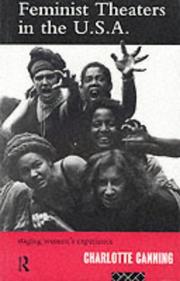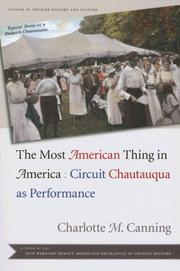| Listing 1 - 5 of 5 |
Sort by
|

ISBN: 041509805X 9780415098052 Year: 1996 Volume: *1 Publisher: London: Routledge,
Abstract | Keywords | Export | Availability | Bookmark
 Loading...
Loading...Choose an application
- Reference Manager
- EndNote
- RefWorks (Direct export to RefWorks)
Theatrical science --- anno 1970-1979 --- anno 1980-1989 --- United States --- Feminist theater --- Feminism and theater --- Theatrical companies --- History --- History. --- Feminist theater - United States - History. --- Feminism and theater - United States. --- Theatrical companies - United States. --- Feminist theater - United States - History --- Feminism and theater - United States --- Theatrical companies - United States --- United States of America

ISBN: 158729592X 9781587295928 9781587295850 1587295857 087745941X 9780877459415 Year: 2005 Publisher: Iowa City : University of Iowa Press,
Abstract | Keywords | Export | Availability | Bookmark
 Loading...
Loading...Choose an application
- Reference Manager
- EndNote
- RefWorks (Direct export to RefWorks)
Between 1904 and the Great Depression, Circuit Chautauquas toured the rural United States, reflecting and reinforcing its citizens' ideas, attitudes, and politics every summer through music (the Jubilee Singers, an African American group, were not always welcome in a time when millions of Americans belonged to the KKK), lectures (""Civic Revivalist"" Charles Zueblin speaking on ""Militancy and Morals""), elocutionary readers (Lucille Adams reading from Little Lord Fauntleroy), dramas (the Ben Greet Players' cleaned-up version of She Stoops to Conquer), orations (William Jennings Bryan speaking
Popular culture --- Chautauquas. --- Education --- Lectures and lecturing --- Lyceums --- Theater --- History
Book
ISBN: 1350332771 135033278X Year: 2023 Publisher: London Bloomsbury Publishing Plc
Abstract | Keywords | Export | Availability | Bookmark
 Loading...
Loading...Choose an application
- Reference Manager
- EndNote
- RefWorks (Direct export to RefWorks)
Book
ISBN: 1587299380 9781587299384 9781587299056 1587299054 Year: 2010 Publisher: Iowa City : University of Iowa Press,
Abstract | Keywords | Export | Availability | Bookmark
 Loading...
Loading...Choose an application
- Reference Manager
- EndNote
- RefWorks (Direct export to RefWorks)
How do historians represent the past? How do theatre historians represent performance events? The fifteen challenging essays in Representing the Past: Essays in Performance Historiography focus on the fundamental epistemological conditions and procedures that serve as the foundational ideas that guide all historians in their endeavors. Unified by their investigations into how best to understand and then represent the past, this diverse group of scholars in the field of theatre history and performance studies offers insights into the abiding issues that all historians face in the task of
Digital

ISBN: 9783839466285 Year: 2023 Publisher: Bielefeld transcript Verlag
Abstract | Keywords | Export | Availability | Bookmark
 Loading...
Loading...Choose an application
- Reference Manager
- EndNote
- RefWorks (Direct export to RefWorks)
| Listing 1 - 5 of 5 |
Sort by
|

 Search
Search Feedback
Feedback About UniCat
About UniCat  Help
Help News
News